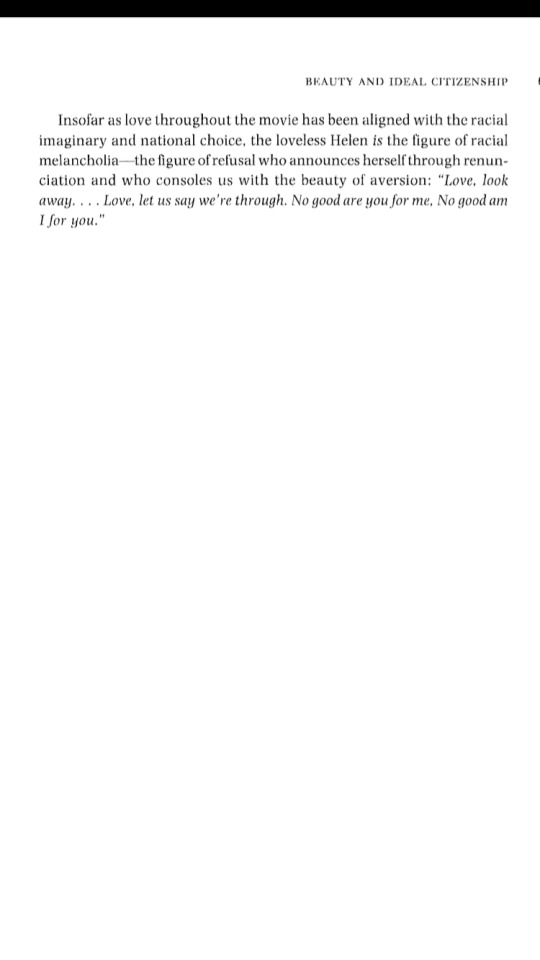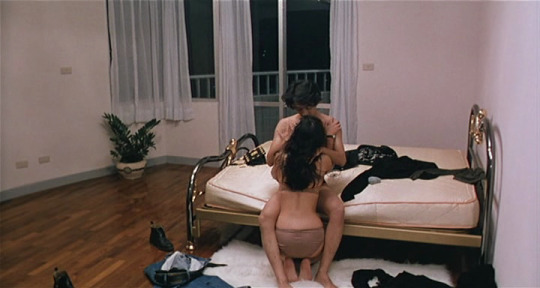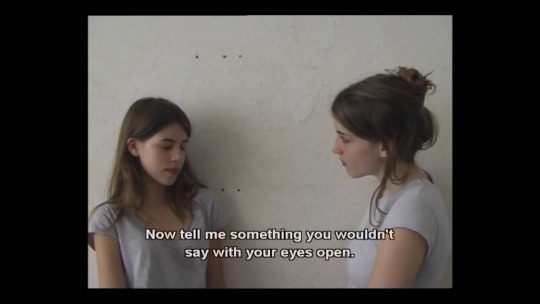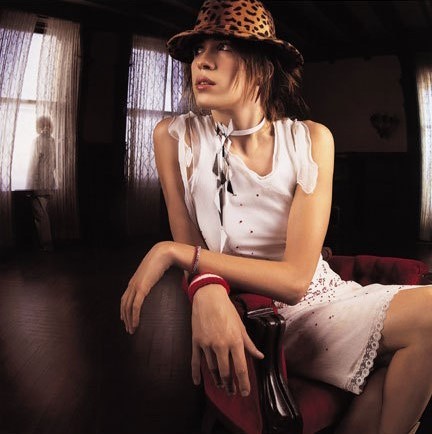Text
the fantasy that busyness means your need is less
11 notes
·
View notes
Text
type is just one way of describing preference in the form of difference
how do you like your difference
5 notes
·
View notes
Text
“Every woman or every woman artist or every person no matter the gender, every artist but especially every woman who has ever wanted to die or just said she did or had that feeling when she felt so maligned and so misunderstood and so defaced and loathed and ignored that she has either died or not, has died inside herself or has dreamed or longed for an exit like death, has been her and we who have promised ourselves to live have to live with that death and the fact it sometimes looks horrendously attractive although we reject it.”
— Ariana Reines, “An Hourglass Figure: On Photographer Francesca Woodman” (h/t Lola)
351 notes
·
View notes
Note
what are your thoughts about hamas / or do you have marxist oriented or just good not western media biased resources for understanding them?
theyre an islamist anti colonial organization, theyre also a political party with a military wing (al qassam brigades) which is what people usually are referring to when they talk about ~hamas~. they won in elections and have a degree of popular support and, because they are the ruling political party, theyre in charge of civil institutions in gaza, like schools and hospitals etc. when reporters describe things like the gaza health ministry as “hamas run” when they would never say this about another political party, they are purposefully trying to delegitimize it and obscuring the fact that they are the government that won in elections, not a rogue terrorist cell. al qassam brigades was not the only part of the resistance that took part in the attack on october 7, there are a bunch of other factions like the islamist PIJ, marxist PFLP and DFLP, and some others. im not the most knowledgable on like politics within gaza and exactly how people feel about hamas but theyre absolutely not a terrorist group, i think theyre much closer to other anti colonial militant organizations like the viet cong and algerian national liberation front. theyre also fighting an asymmetrical war using guerrilla strategies like the viet cong and nlf, and western media misrepresents this with all the shit about “hiding weapons by civilians” or whatever. i would recommend looking into the history of guerilla warfare and anti colonial struggle to understand why im criticizing media representations of it. they also make a lot of their rockets from scraps of israeli bombs! i think people should make a better distinction that hamas is a political party with a military wing (al qassam brigades) because then its more obvious that bombing civilian infrastructure thats allegedly “hamas run” is a war crime. also i heard in their statements that most of their militants are orphans whos parents were killed by israel and i think that should be noted. i think its also incorrect to say they have an issue with jews in general and are rabidly antisemitic as if their main aim is to kill jews, the way most media portrays them. they very specifically exist because of the continued occupation of palestine and without that i do not think they would give a shit about jews. they attack settler because theyre settlers, not because theyre jews. idk this article was pretty good and has a link to their 2017 charter where they specifically say their struggle is against zionism not jews
heres their charter thats linked in the article but ngl i just recommend reading their statements and material in general. not saying take every single thing at face value but theyre a political party with issues like any other, not evil sadistic terrorists. and why let mainstream media set the terms of your understanding of them
3K notes
·
View notes
Text



The Melancholy of Race
As the model of successful compromise, Helen turns out to be not enough, not the real thing: neither the sex goddess nor the innocent girl, neither authentically West nor authentically East. The potential plenitude of biculturalism promised by Helen becomes an evacuation of authenticity, revealing authenticity as finally but another form of investment in "types." Accommodation without transgression is failure and thus not of interest. In other words. Helen has not failed enough. She is the category celebrated as culturally desirable but is in the end undesirable, because this is a world that is finally not very interested in witnessing the fulfillment of racial integration. Lost forever in exile and endlessly mourning, Helen embodies both the longing for and the relinquishment of communal desire. Exclusion is her a priori condition
Preface
"Immigrating when I was almost an adult protected me from certain experiences of social exclusion (since the immigrant has the comfort of imagining she cannot be excluded from that to which she never belonged), but such consolation is already an act of psychical management. It is the foreigner within me who most eagerly needs to understand the web of American racial dynamics and their particular articulations of aspiration and rejection, assimilation and expulsion."
-
White girls have their Jacqueline Rose, I have my Anne Anlin Cheng
2 notes
·
View notes
Photo



Sophy Rickett,
“Pissing Woman”
VAUXHALL BRIDGE, OLD STREET, SILVERTOWN, 1995
1K notes
·
View notes
Text
“…these small decisions lead to a life just as each line here, each decision to make an incision onto the page, small unto itself, lengthens into a long poem, each new long poem builds into a book, each decision an incision onto time, mostly imperceptible in retrospect, not seen as decisions usually, just things you’re doing or have to do, insignificant, far from irrevocable, but they add up, incising a vague shape on the blank vast that says you are here…”
—
“Always Finish What You Start”
Jason Koo / Prelude Mag
3 notes
·
View notes
Text
“All present men are stand-ins for former men. And all men are stand-ins for our fathers. And even our fathers mean less than our own self-preservation. May you not go around the world looking to fill what you fear you lack with the flesh of another human being. That’s part of what this story is for.”
— Animal, Lisa Taddeo
31 notes
·
View notes
Text
“BLACKBOXING: An expression from the sociology of science that refers to the way scientific and technical work is made invisible by its own success. When a machine runs efficiently, when a matter of fact is settled, one need focus only on its inputs and outputs and not on its internal complexity. Thus, paradoxically, the more science and technology succeed, the more opaque and obscure they become.”
— Bruno Latour, Pandora’s hope: Essays on the Reality of Science Studies
1K notes
·
View notes
Text
“Emotion is retro.
Feelings are history.”
“It’s been five years since my last dream came true.” -Teri Garr, One From The Heart I took the soundtrack One From The Heart with me to California, where I went to write at an artist’s retreat for a month. W and I had gotten in touch a week before I left New York and made a plan to meet. It had been ten years, and we’d found each other on the internet. That sounds obvious now, but in 2004 it was less obvious. The internet wasn’t the first place you went to find things yet. First I found W’s handwritten letters in a box, then I typed his name into Google. Unbeknownst to me, he’d been doing the same thing all week, only he wasn’t getting anywhere. He was easy to find, I wasn’t. When he called the artist’s retreat, which listed the dates of my residency on their website, to ask them for my number, he was told that the information was confidential. He didn’t know what else to do, so he kind of gave up. And then, a couple of days later, he got my email.
It all started, he told me, with our common friend, C, (who’d known the both of us back then) asking him, “Whatever happened to Masha?” on the phone every year.
I listened to “One From the Heart” in my room after we saw each other again.
A week before my trip to California, I purchased a bunch of movie soundtracks to take with me. I had been watching 80s Coppola–One From The Heart, The Outsiders, Peggy Sue Got Married. His Time Trilogy. His Genre Trilogy, which is how I think of these films.
How does a film show up again and why? How does a person? Who are they the second time around? Who are you? The history of genre is also the history of emotion. Genre and gender are allegories of time. Coppola’s boys in The Outsiders are like girls. Like Natalie Wood in Splendor in the Grass. I remember how much the score to The Outsiders made me cry as a kid. What was I so sad about? Why did movies always unleash such a barrage of tears? Why did the film’s pink color? Two feminine-looking and feeling boys talking about what’s pretty and turning pink like the sky. As a boyish girl this, among other things, really got to me. People making the world beautiful again just by talking to each other in a way they’re not supposed to because they are boys. There is a lot of cinematic history in the back (not even the back) of this scene from The Outsiders– Kazan and Sirk. Splendor in The Grass and East of Eden.

Writing about Coppola’s Dracula in her essay “From Dracula–with Love,” film theorist Vera Dika points out something that defined much of Coppola’s work in the 80s and early 90s, “By including the name of the novel’s author in his work, Coppola refers us back to the ‘original,’ but does so precisely at the close of the twentieth century, in an era that has been called postmodern and where the original is often hopelessly muted.” In Coppola’s 80s films, the original isn’t simply the film that came before, it’s before coming later, and then again. A film at one time, passing through time, and returning as something else. Something extra. This is not the same thing as reflexivity, but rather, as Dika puts it, “a postmodern neo-mythification.” Neo-mythic is epic, as is blatant emotion in a time when we are supposed to have receded from emotion even in movies. Emotion is retro. Feelings are history. A few weeks ago I remembered the song One From The Heart for some reason, heard it in my head. I remembered how I listened to the song on my headphones in my room in California while I worked, replaying the first time he touched me again. It felt like the inside of his hand, which is the first way he touched me after 10 years. I thought I was going to melt when it happened and then thinking about it, to this song afterwards, in my California room, just blew it all out of proportion. Luckily he meant it the way I took it.
At the retreat, he would sometimes show up at my door to pick me up for our all-night dates agitated but soft for me. I think that’s maybe my favorite combination. Agitated but soft. People who are like forbidden cities. People who only love people who have the key to them. People who unlock each other.
Old trailer: New trailer: * Movie love. The look of love. How movies do love. What movies have done to love. How we love or don’t love because of the movies. How we let ourselves love in movies but not in real life. What came first, movie love or real love? Which one is real and which one isn’t? Which one still exists? Which one doesn’t? One From The Heart is about all these things, whether it means to be or not. * We were sitting in the car, which we’d stopped in the middle of the road, up in a forest of redwoods. It was 3 o'clock in the morning and he was doing field work. It was raining. We were following his friend’s (also a biologist) car, who stopped because he saw a Tiger salamander that had been hit and run over. Still alive, its head was crushed and it was suffering, barely breathing, so we had to put it out of its misery. When he touched me afterwards, for the first time, it broke all the ice and unleashed a flow of touch that didn’t stop for years. He looked at me, sighed, and cupped the back of my head and the side of my face in his hand–his arm stretched all the way across. His look. It was the same look he gave me when we were kids. From across a room.
He knew I’d been injured, crushed, like that salamander. I was suffering and he showed up and put me out of my misery.
“He held me like the mother I had never had,” Fanny Howe writes in The Wedding Dress. Except I do have a mother like that, so I know how rare it is for a man to love you, to touch you, like a mother. Mother instead of father. We need more mother love. Wanting mother love is queerer than the standard girl wants her father and boy wants his mother. Nothing really gets challenged in that binary. There is Daddy’s girl and there is Mama’s boy, but is there a Daddy’s boy or a Mama’s girl? The feminine and the maternal in men is rarer than the phallic and the masculine in women, for women (both straight and queer) are taught to identify with sexism in order to access power. But what man is taught that strength is synonymous with vulnerability and femininity? What man is told that he’ll be rewarded if he cares for you like a mother?
I played that night over and over again in my head like a song. Whenever I listened to “One From The Heart” at the writing retreat in California, I remembered the way he touched me in the car.
* Why am I writing about him? It’s not because I want anything from him anymore and it’s not because I feel something now. That person is/those people are/gone. That ship has sailed. But sometimes I still remember what it/we used to feel like. The way he/we used to be.
The confusion of “yous” here is a comment on intimacy as well as distance. How close someone gets. How in and out of closeness. How it’s one person, then another. Mixing personal pronouns is like a riddle. Sometimes there are three different yous in a story. Sometimes three different yous in a you. Sometimes a you is a dedication. Sometimes a summoning. Sometimes a seance. How many times am I going to raise you –all of you–from the dead?
In Blind Date: Sex and Philosophy, Anne Dufourmantelle writes, “Why, and how, do you exist? Since 'I’ comes from 'you’…Since we are born of another, and we die alone…Philosophy is a language for coming to terms with the foreign body that I call 'you,’ the plural world that persists in being other than itself, the language that makes beings of words and desire.”
Of course this is what Dracula is about, too. The foreign bodies that “I” call “you.” The foreign body (mine) that I put into you (yours).
I’ve been writing in the second person for years. In my story “Proverbial” from Beauty Talk & Monsters and in “Solace”. I don’t know if anyone has picked up on this. Sometimes I don’t know what people read when they read my work. Judging by what they say, or don’t say, it seems like they mostly don’t know how to read it. But if they can’t read it, does that mean I didn’t write it, and vice versa?
Maybe writers always feel this way. Unread and misread. And maybe they should. Maybe lovers do too.
“A text is not a text,“ Derrida writes in "Plato’s Pharmacy,” “unless it hides from the first comer, from the first glance, the law of its composition. A text remains, moreover, forever imperceptible.”
Roland Barthes says similar things about love and the lover in A Lover’s Discourse. Some days it feels hopeless. What should we have more of and what should we have less of? Hope?
A text is for someone. Not for everyone. The way someone is for someone. Not for everyone.
I reveal what I hide and hide what I reveal, both as a woman and as a writer, because all my work is like a noir. Echoing Derrida, in Notes on the Cinematographer, Bresson writes:
"Hide the ideas, but so that people find them. The most important will be the most hidden.”
And
“To have discernment (precision in perception).”
Choose your revelations wisely. Everything is not what you show, but how, and also why, when, and to whom.
Bresson: “Your images will release their phosphorus only in aggregating. (An actor wants to be phosphorescent right away).”
I wonder if people see the connection between Bresson’s idea of aggregation and the lines in LACONIA: 1,200 Tweets on Film?
Bresson: “See your film as a combination of lines and of volumes in movement apart from what it represents and signifies.”
In this case words also apply.
In an interview about LACONIA, I said: “The entire book is an answer song, a noir, and given how I’m a digressive and analogical thinker–how I almost can’t think otherwise–it’s no wonder that a book like LACONIA came out of me. In an essay called 'Bewilderment,’ Fanny Howe writes, 'One definition of the lyric might be that it is a method of searching for something that can’t be found…It says, 'Not this, not this.’ instead of, 'I have it.’ I think my whole life works this way.”
To have discernment (precision in perception).
12 notes
·
View notes
Text
i need to know right now what is your relationship to longing
3 notes
·
View notes












